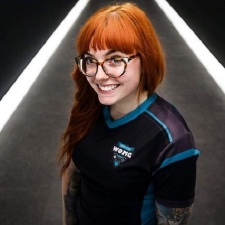The games industry plays host to a colourful cast of diverse individuals, from designers and presenters to directors and writers.
The skills to pull off these roles, however, are complex and differing, with each position requiring mastery in its field.
In the lead up to International Women's Day - taking place on March 8th, 2020 - PocketGamer.biz is spotlighting a number of women from the games industry under our Jobs in Games series, all this week.
Each profile will bring along a certain set of expertise, a different background, and a wealth of knowledge to be shared with all. Most importantly, for women looking to join the industry, there'll be some key information on how to get started, and vital bits of advice for making the jump into games.
Today we are speaking to Sumo Digital assistant games designer and Women Making Games co-founder Lucy Smith about how a path in psychology led her to a role in games.
PocketGamer.biz: Can you tell us about your current role and what it entails?
Lucy Smith: Hello, my name is Lucy, and I am an assistant games designer at Sumo Newcastle. My main job responsibilities include: working within Unreal Engine 4, liaising with the design, art, QA and programming teams, participating in playtests, listening and addressing player feedback, maintaining and updating documentation as well as bug fixing.
I'm glad I took the time to research the industry instead of rushing into something that might not have been for me.Lucy Smith
How did you first get into games and how did you progress into the role? What did you study (if anything) to get your role? What courses would you advise for aspiring professionals in the area?
Since the age of four, playing games has been a huge passion of mine. I was gifted a PlayStation for Christmas 2000 from my parents and from that, my interest continued to grow from there. Years later, when The Legend of Zelda: Breath of the Wild released in March 2017, I finally decided to pursue my dream.
At the time I was training to become a counsellor, so began searching how to get into the games industry. It was actually my counselling tutor who really encouraged me to pursue this as she could see my passion when I was talking about Zelda.
Soon after that, I applied for my degree in Games Technologies at Newcastle College. In terms of courses, if you know what you want to do, pick the area you want to specialise in, for example, programming. If you are like me, however, and knew nothing about games development, attending my course was really beneficial because it made me aware of what each role entailed, on top of giving a flavour of what I would enjoy.
Furthermore, I went to networking events such as Develop to build connections with people across the UK. This helped me to start doing bits of work experience in design and testing to gain a better insight into games development as a whole.
Is it something you ever imagined yourself doing?
I always dreamt of making games when I was a kid. I remember playing in the Mapmaker mode in Timesplitters and thinking how cool it was to build my own levels. I never knew it was a career choice and I know a lot of others have felt the same as me.
When arriving at college, I decided to study my A-Levels in Psychology because I adored learning about the subject, which lead me to the route of counselling. Although games courses were starting to become popular back then, I didn't have the confidence for it but I'm glad I took the time to research the industry instead of rushing into something that might not have been for me.
What part of your role do you find most fulfilling?
I don't think there's one thing I could say as there are so many aspects of my job I find fulfilling. If I had to choose, I would say I love being in a collaborative environment where everyone shares the same vision.
Feeling that sense of accomplishment and challenge when working on our tasks is great as there's always an opportunity to learn something new along the way. We all support and work together as a team and it's great to be a part of this.
What do you find are the most common misconceptions, public or professional, about women working games?
My advice to current students would be to research job specifications and tailor your studies to that particular dream job role.Lucy Smith
I think my own misconception was that I didn't know games was a genuine career path that people could get into, which I'm sure a lot of people can empathise with. It sounds weird to say, because of course people were making games. As a kid though, you just don't think of careers like that.
I've conducted a few workshops in the North East to help young girls make their own video game. What's great about this is that not only does it educate the attendee, but it makes the parents/guardians aware of this as a serious career path that they could go down, if interested.
In my experience, I find that as long as young girls are aware of the option, regardless if they choose to pursue it or not, I've done my part in helping to break that misconception.
Is there anything about the job/industry you wish you would have known when first joining?
I don't think there's anything I wish I knew before joining. I've enjoyed taking everything in my stride and learned as I went along.
What other advice do you have for any women out there looking for a job in this profession?
My advice is to be simply true to yourself. I didn't know anything when beginning my degree so I'm quite proud to see how far I've progressed in a short amount of time. Anyone who has a strong work ethic and attitude can achieve anything - if I can do it, so can you!
My advice to current students would be to research job specifications and tailor your studies to that particular dream job role. I tailored my university work to fit the job specification, so even if I didn't have any industry experience, I still had something to show at any given interview.

Finally, I used to document my development journey on social media and I found that really useful when engaging with the community because I was able to show off my work to lots of people, as well as gain a presence on the internet.
PocketGamer.biz will be releasing a new profile every day this week to celebrate International Women's Day 2020. You can keep up-to-date with them all here.






















